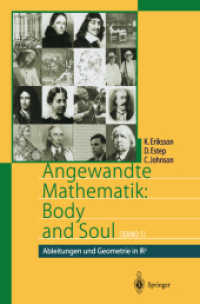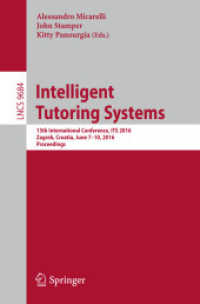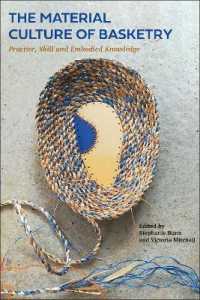- ホーム
- > 洋書
- > 英文書
- > Cinema / Film
基本説明
Although working mainly within a linguistic stylistic framework the analysis carried out takes on board the multi-semiotic and multimodal components of film discourse.
Full Description
Roberta Piazza's book is a linguistic investigation of the dialogue of Italian cinema covering a selection of films from the 1950s to the present day. It looks at how speech is dealt with in studies of the cinema and tackles the lack of engagement with dialogue in film studies. It explores the representation of discourse in cinema -- the way particular manifestations of verbal interaction are reproduced in film. Whereas representation generally refers to the language used in texts to assign meaning to a group and its social practices, here discourse representation more directly refers to the relationship between real-life and cinematic discourse. Piazza analyses how fictional dialogue reinterprets authentic interaction in order to construe particular meanings. Beginning by exploring the relationship between discourse and genre, the second half of the book takes a topic-based approach and reflects on the themes of narrative and identity. The analysis carried out takes on board the multi-semiotic and multimodal components of film discourse. The book uses also uses concepts and methodologies from pragmatics, conversation analysis and discourse analysis.
Contents
1. Background and Introduction; 2. The verbal-visual interrelation in cinema; 3. The focus on the representation of conflict in film; 4. Confrontational discourse in comedy and the disengagement of dramatic talk. 5. Spaghetti and American westerns: textual conflict marking the clash between opposing masculinities; 6. The struggle for narrative autonomy in Antonioni's When Love Fails; 7. The discourse of identity and confrontation in Mohsen Melliti's Me, the Other; 8. Conclusions; 9. References and filmography; Index.








